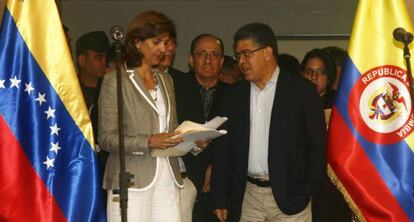Venezuela seeks economic aid from Colombia to prop up its failing economy
Foreign Ministers Elías Jaua and María Ángela Holguín join efforts to fight smuggling along the Colombian-Venezuelan border

The Venezuelan government is trying to maintain its state-managed economic model. Colombia, its last ally in the campaign to control prices and defeat the harsh laws of the free market, has agreed to help fight smuggling along the border. Smuggled goods include basic foodstuffs, construction materials, among other merchandise.
Foreign Ministers Elías Jaua y María Ángela Holguín signed the accord after a meeting in Maracaibo, one of the three Venezuelan states that share a border with Colombia. President Juan Manuel Santos is keen to form the alliance in order to protect the Colombian industry, especially since smuggling business has caused a spike in violence in the region. "Smuggling finances bacrim [criminal gangs]," Holguín told the press.
In Venezuela, where the government has regulated gas prices for the last 18 years, a liter sells for 0.01 dollar based on the official exchange rate (6.23 bolivars to the dollar). Meanwhile in Colombia, the same liter costs a little over a dollar. That margin is the incentive that drives the black market and its operators. Twelve billion dollars a year in government subsidies in Venezuela have distorted commercial relations and affected the Colombian financial markets. Every day an estimated 30,000 barrels cross the border - a long and complex region impossible to patrol in its entirety.
In 2013, Venezuela experienced shortages and inflation reached 56.2 percent, the highest in the world. The scarcity index climbed to 22.2 percent in December, the highest level since 2008. Calling on Colombia to enter this agreement signals that price control measures, the so-called circulation guides which dictate how much of each product should go to what area, are no longer effective. They fail to prevent the sale of the same products at market price on the other side of the border.
The Venezuelan foreign minister acknowledged that the agreement will be difficult to implement. But, both governments are committed to the action plan. They will look for legal measures to thwart "raspacupos" or "card scratchers" - the Venezuelan travelers who use their credit cards to take out money while in Colombia and then resell it on the black market where foreign currency exchanges at 12 times the official rate.
They will also look for Colombians who live in Venezuela who send money home in Colombian pesos. The governments will work on creating mechanisms to return seized contraband goods.
The neighboring countries will work together to study the smuggling activity of the Wayuu indigenous people in Zulia province in the department of Guajira. For the Wayuu it is an ancestral tradition because they do not acknowledge territorial boundaries. In local jargon they are called "bachaqueros" or "ants" because they travel in caravans of large groups. "We have come to an agreement about how to manage legal commercial activity in order to ensure delivery of provisions to this area," Jaua said.
The meeting took place just as Venezuelan authorities and the Wayuu people, whose livelihood depends on smuggling, clashed on various occasions this week. On Wednesday officials seized 939 tons of food in Táchira, a bordering state with Colombia. The operation was led by National Assembly President Diosdado Cabello, the administration's second in command. His presence suggests worry on the part of the government as it appears to be losing control of the situation.
These measures are an attempt to keep a hold on the economy and avoid liberalization, impossible to countenance in Chavista philosophy. Besides the bilateral campaign against smuggling, Venezuela passed the Fair Price Law which calls for a ban on private shipment of foods and medicines and up to 14 years in prison for smugglers of regulated goods.
All of these warnings reinforce the pleas to strengthen the weak conscience of the Venezuelan people. Before announcing the agreement Jaua asked Venezuelans living along the border to "reflect and rectify because you are doing great harm to the country. Nothing justifies leaving the Venezuelan people without basic foods."
Translation: Dyane Jean François
Tu suscripción se está usando en otro dispositivo
¿Quieres añadir otro usuario a tu suscripción?
Si continúas leyendo en este dispositivo, no se podrá leer en el otro.
FlechaTu suscripción se está usando en otro dispositivo y solo puedes acceder a EL PAÍS desde un dispositivo a la vez.
Si quieres compartir tu cuenta, cambia tu suscripción a la modalidad Premium, así podrás añadir otro usuario. Cada uno accederá con su propia cuenta de email, lo que os permitirá personalizar vuestra experiencia en EL PAÍS.
¿Tienes una suscripción de empresa? Accede aquí para contratar más cuentas.
En el caso de no saber quién está usando tu cuenta, te recomendamos cambiar tu contraseña aquí.
Si decides continuar compartiendo tu cuenta, este mensaje se mostrará en tu dispositivo y en el de la otra persona que está usando tu cuenta de forma indefinida, afectando a tu experiencia de lectura. Puedes consultar aquí los términos y condiciones de la suscripción digital.








































